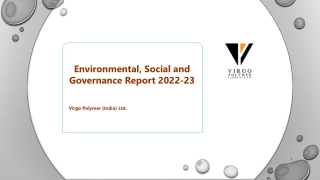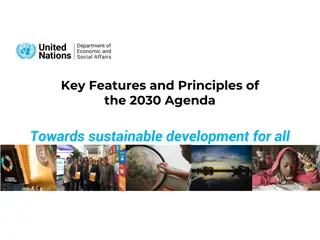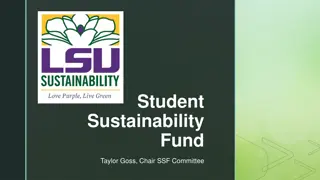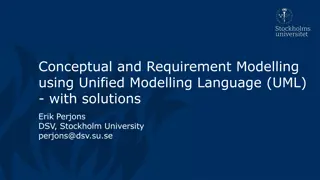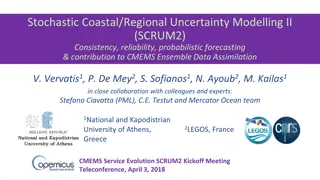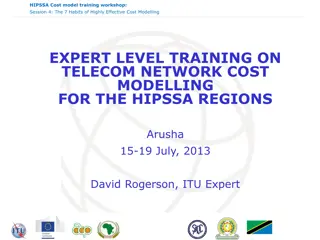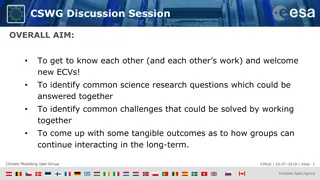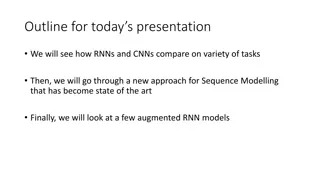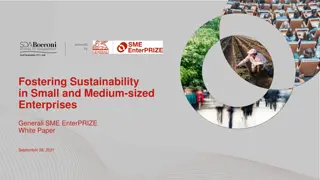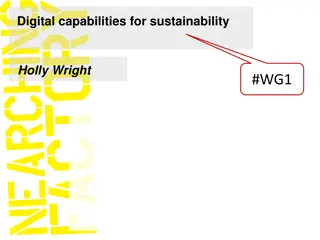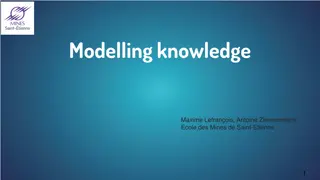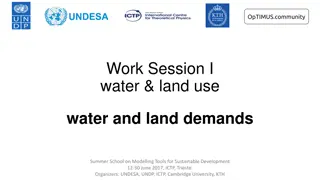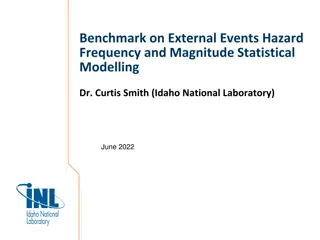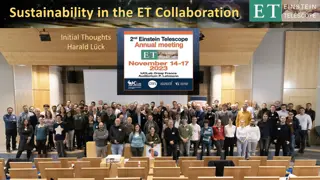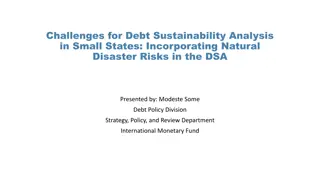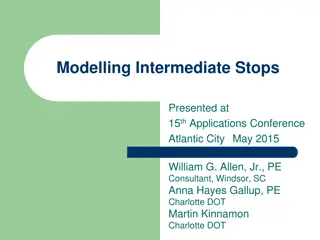Modelling Sustainability Challenges and Solutions for the 2030 Agenda
Heightened complexity in decision-making, global vs. national policy alignment, and sustainable development models are key aspects of addressing the challenges in meeting the 2030 Agenda. Integrated assessment modelling, food-energy-water nexus, and the CLEWS framework play vital roles in guiding policies towards sustainable development.
Download Presentation

Please find below an Image/Link to download the presentation.
The content on the website is provided AS IS for your information and personal use only. It may not be sold, licensed, or shared on other websites without obtaining consent from the author.If you encounter any issues during the download, it is possible that the publisher has removed the file from their server.
You are allowed to download the files provided on this website for personal or commercial use, subject to the condition that they are used lawfully. All files are the property of their respective owners.
The content on the website is provided AS IS for your information and personal use only. It may not be sold, licensed, or shared on other websites without obtaining consent from the author.
E N D
Presentation Transcript
The 2030 Agenda SDGs & Science
Heightened complexity The challenge: How to decide when linkages point in different directions Need a way of measuring impacts to be able to compensate the trade-offs and to complement with additional policy options Global models Give a sense of global consistency Provide a reference for national policies But cannot directly guide national policies
Modelling for sustainability: from global to national Energy Systems models CGE global trade models Global Physical Feasibility Sustainability Investments Global Damage cost Wellbeing GLOBAL IAM GLOBAL CGE or EW National Sustainable Development Policies CLIMATE MODELS: EMISSIONS & CLIMATE Geo-Spatial Electrification National Energy Systems models Integrated Assessment Climate, Land, Energy, Water, Systems CLEWS National CGE or EW models Microsimulation
Sustainable development The food-energy-water nexus National Development Policies Food Food, energy and water systems are highly interlinked Often referred to by the term nexus Part of broader development challenge as reflected in Agenda 2030 for Sustainable Development National Sustaina ble Develop ment Policies Energy Water
CLEWS An analytical framework and model Energy Model Energy for fertilizer production Energy required for field preparation and harvest Biomass for biofuel production and other energy uses Energy for water processing and treatment GHG emissions Energy for water pumping Energy for desalination Water available for hydropower Water for power plant cooling Water for (bio-)fuel processing Climate Water Model Land-use Model Precipitation, temperature Water for biofuel crops (rain -fed and irrigated) Water needs for food, feed and fibre crops (rain-fed and irrigated)
Addressing complexity Modelling Tools Approach Sound, adapted & based on NATIONAL development PRIORITIES Socio- economic impact A suite of models. No single model can cover all relevant issues Economy- wide Accessible, unrestrained from proprietary specification (open source) Integrated Assessment System Modelling System User-friendly, communication effective Integrated Assessment Energy Systems Tapping on research & the knowledge-creation communities Electricity for All Responding to demands for CAPACITY BUILDING
BUILDING ANALYTICAL CAPACITY FOR SUSTAINABLE DEVELOPMENT POLICIES 2005-2015 20 countries 2015-2017 Bolivia Costa Rica Ghana Kyrgyzstan Mongolia Nicaragua Paraguay Uganda
PROJECT SCHEDULE OF ACTIVITIES: CLEWS WORKSHOP I 40 hrs./each WORKSHOP 4 10 hours WORKSHOP 2 40 hrs./each WORKSHOP 3 40 hrs./each D A T A S C O P I N G P U B L I C A T I O N S W O R K W O R K W O R K - Insights from modeling INTEGRATED MODELLING CLEWS WATER MODELLING ENERGY MODELLING A T A T G A T H E R I N G A T - Informing policy debate Data use Scenarios Interpreting Data use Scenario Interpreting Data use Scenario Interpreting D I S T A N C E D I S T A N C E D I S T A N C E - Outreach, disseminate ITERACTIVE MODEL BUILDING 1st year 2ndyear
BUILDING INSTITUTIONS TO INFORM SUSTAINABLE DEVELOPMENT POLICIES MODELS MODELS ECONOMY -WIDE ENERGY INTEGRATE D ASSESS- MENT MICRO- SIMU- LATION SECTOR MODELS SECTOR MODELS AWARNESS OF MODELLING MECHANICS, POWER AND LIMITATIONS



